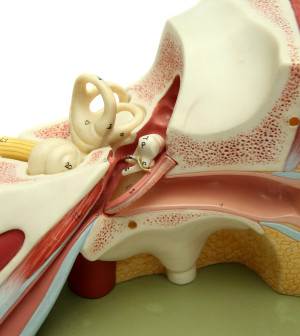- Could Your Grocery Store Meat Be Causing Recurring UTIs?
- Are You Making This Expensive Thermostat Error This Winter?
- Recognizing the Signs of Hypothyroidism
- 10 Strategies to Overcome Insomnia
- Could Artificial Sweeteners Be Aging the Brain Faster?
- Techniques for Soothing Your Nervous System
- Does the Water in Your House Smell Funny? Here’s Why
- Can a Daily Dose of Apple Cider Vinegar Actually Aid Weight Loss?
- 6 Health Beverages That Can Actually Spike Your Blood Sugar
- Treatment Options for Social Anxiety Disorder
For Mexican-Americans, Heart Risks Can Rise Even If Not Obese


In Mexican-Americans, heart-damaging risk factors such as high blood pressure or high blood sugar levels are common, even in the absence of obesity, a new study finds.
Those who weren’t obese but were metabolically unhealthy showed similar signs of early artery hardening as those who were obese, according to the study published in the March 18 issue of the Journal of the American Heart Association.
Hardening of the arteries increases the risk of heart disease and stroke.
The findings suggest that “interventions to maintain metabolic health may be a more important goal than focusing on weight loss alone [for Mexican-Americans],” study lead author Dr. Susan Laing, a professor of cardiovascular medicine at the University of Texas Health Science Center at Houston, said in a journal news release.
Laing’s team used ultrasound to measure the thickness of neck arteries to detect signs of hardening among more than 500 Mexican-Americans living along the Texas-Mexico border.
The participants’ height, weight, blood pressure, blood sugar, cholesterol and body mass index (BMI, an estimate of body fat based on height and weight) were also checked.
Nearly one-third of the volunteers showed early signs of hardened arteries, 52 percent were obese, and nearly 78 percent were considered “metabolically unhealthy.”
Metabolically unhealthy is defined by having two or more of the following risk factors for heart disease: high cholesterol, high blood pressure, high blood sugar levels, elevated triglycerides, insulin resistance or high levels of C-reactive protein.
Those most likely to be metabolically unhealthy based on these risk factors — but who were not obese — included men (49 percent versus 29 percent of women), older people, those with a larger waist size, and those with less education.
Metabolically unhealthy Mexican-Americans were also less likely to eat the recommended four to five servings of fruits and vegetables a day, the researchers found.
Overall, the findings suggest that “even among non-obese Mexican-Americans, there is already a high prevalence of clustering of cardiometabolic risk factors,” Laing said.
Two experts in heart health weren’t surprised by the findings.
“It is a common misconception that all skinny individuals are healthy,” said Dana Angelo White, a sports dietitian and assistant clinical professor at Quinnipiac University in Hamden, Conn.
“I come across many people that are at a ‘normal’ weight in terms of [‘ideal’] body weight charts, but they still suffer from things like hypertension and high cholesterol — so it’s not just about the number on the scale,” she said.
Dr. Stacey Rosen is vice president of women’s health at The Katz Institute for Women’s Health in New Hyde Park, N.Y. She said the findings don’t bode well for the health of Mexican-Americans, in particular.
“With the Hispanic population projected to reach 30 percent of the U.S. population by 2050, and Mexican-Americans — who bear a disproportionate burden of poor cardiometabolic health — representing the largest subgroup, the importance of culturally appropriate and focused public health initiatives aimed at reducing risk is critical,” she said.
More information
The U.S. National Heart, Lung, and Blood Institute has more about hardening of the arteries.
Source: HealthDay
Copyright © 2026 HealthDay. All rights reserved.










